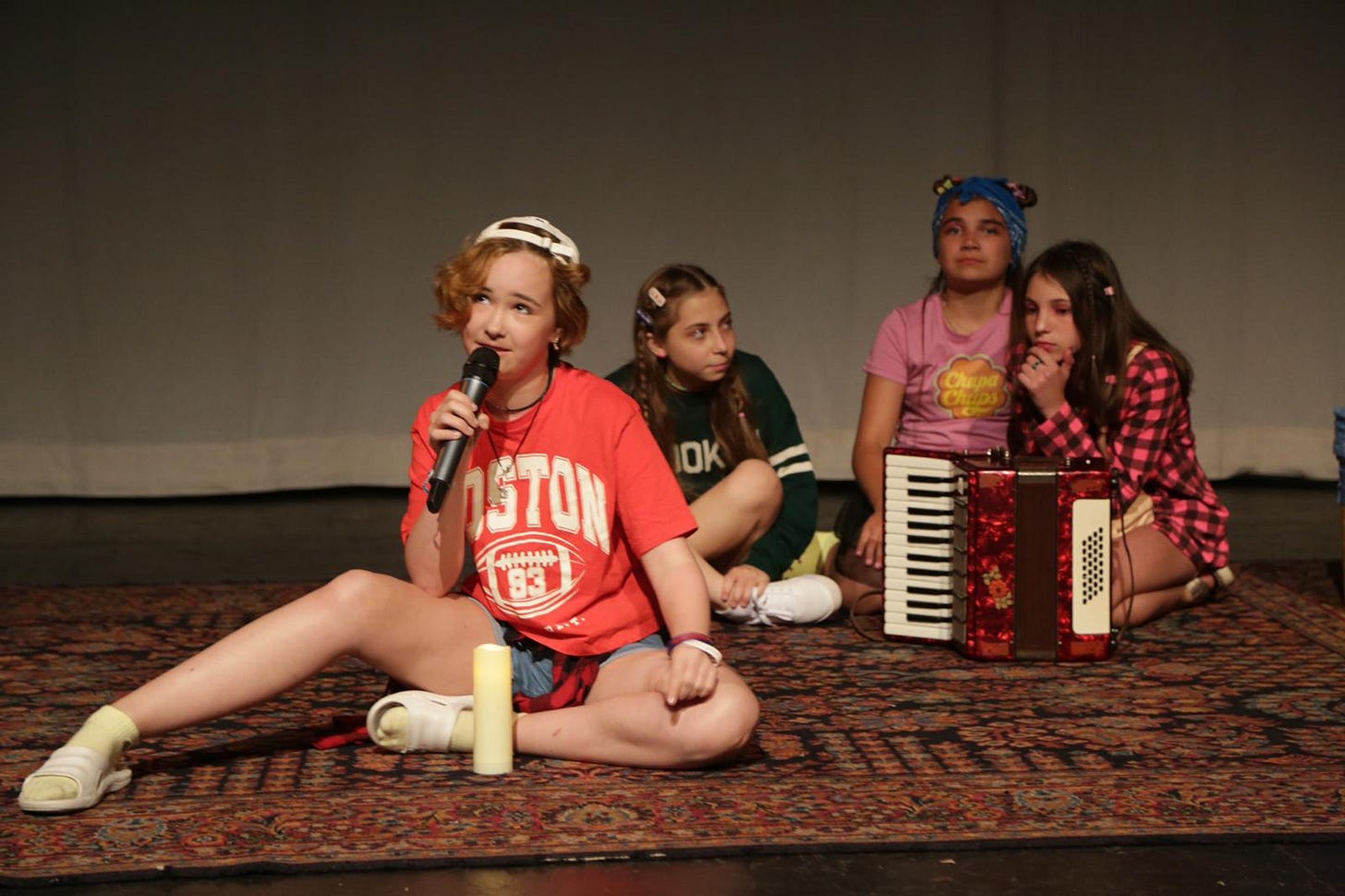Eight Ukrainian Children and the Limits of Theater
Irondale brings "Mom On Skype" direct from Ukraine - but are we really listening?
Two unique theatrical moments played out at this past Sunday’s performance of Mom on Skype at the Irondale Center in Brooklyn. The first was the show itself, a rehearsed, carefully crafted piece of work. The second was a spontaneous explosion of sadness, fear and rage unlike anything New York audiences would normally experience in a theatrical space.
Mom on Skype consists of a series of monologues on the theme of parents separated from their children. The cast was composed of eight Ukrainian children, ranging in ages from 7 to 14, who traded off delivering the monologues; the full group performed musical numbers in between each story.
Irondale’s artistic director, Jim Niesen, and executive director, Terry Greiss, contacted the troupe after reading a New York Times report about Mom On Skype being performed inside a warehouse-turned-bomb shelter in western Ukraine. Irondale then quickly raised money for the residency.
The piece’s original director, Oleg Oneshchak, is an active soldier and was unable to make the trip. His wife, Mariia Oneshchak, also a theater artist, came in his place and staged the work in Brooklyn August 13-14.
The stories that make up Mom On Skype were written before the invasion, so the show does not directly address life in Ukraine right now. Instead, the monologues quietly and indirectly evoke the trauma of families torn apart by war, and of kids seeing their childhoods stolen away from them.
The play was performed in Ukrainian with English supertitles, and some nuances certainly got lost in translation. With a cast this truthful, though, that didn’t matter a lot. The eight actors performed with poise, open-heartedness and – when called for – brutal directness. That directness ensured we felt every resonance of the piece to their home country’s plight: the grief for what has been lost, the rage at the needless suffering, and the maddening frustration at their powerlessness to stop it.
Even so, a worry within the cast emerged following the show’s conclusion: Had we gotten the point? And so came the unexpected part. Following a translated curtain speech from director Oneshchak, each young cast member grabbed the microphone and, one by one, spoke extemporaneously in English about the brutal realities facing their homeland.
As the speeches started, they initially seemed needless, a repetition of what the show had already conveyed – and perhaps they were. (Some patrons began to file out, which was a bold move given the context.) But where the show had taken a roundabout approach, these speeches were startlingly direct. The kids spoke of families shattered, communities destroyed, lives upended.
True, these eight young artists were limited by halting English in what they communicated. And not everything they spoke in passion was accurate. (One actor stated that all Russians support the war, which is an oversimplification.)
Yet the most remarkable moment came when performer Marharyta (Margo) Kuzma declared we had not understood one darkly comic monologue, which concerned a child’s abandonment by their parents. Like much of the show, that section had elicited laughs from this warm crowd, which like most American audiences was keen to offer plentiful auditory response.
“You laughed at this, but it is not funny,” Margo stressed. “It is so, so sad. You need to understand this, you need to understand this is happening to kids in the Ukraine right now.”
Now, it is hard to say if we did fail to understand (perhaps due to the language barrier); or, if Kuzma was misreading an over-eager audience’s reaction to dark humor.
But most striking was Kuzma’s entirely understandable frustration with, essentially, the limits of theater. What does it accomplish for these kids to come to New York City and do this play? Soon they will return home to a war still raging, while we privileged theatergoers return to our comparatively easy lives. What use was telling their story to a bunch of Americans who chuckled at the jokes, sighed at the sad bits, then left feeling a bit better about themselves? The immediacy of the project, so unusual for New York theater, also placed its inherent limitations in a harsher light.
Following Kuzma’s words, Greiss acknowledged this point as he closed out the evening. His own answer to wondering how Irondale could help, he explained, had been to keep doing what they do, but “better than they’d ever done it before.” That meant this show – a huge undertaking, and the most timely theater piece he could imagine.
It takes nothing away from Irondale’s accomplishment to admit that, in the harsh light of these artists’ brutal honesty, it was unclear what we’d accomplished by gathering here. The event spread awareness, perhaps; raised some money, for sure; allowed these young artists an outlet, absolutely. It’s not a lot. It’s what we can do.
As Greiss bid us goodnight, the children began to sing together once more while we filed out. Their voices echoed through the huge space, following us out the doors and into the hallways. They would not be forgotten.





